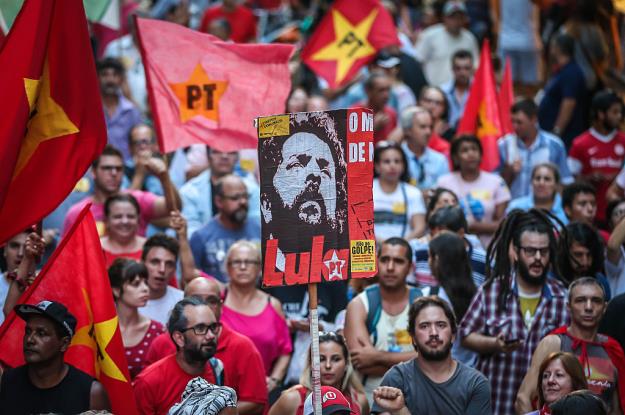Former President Luiz Inácio Lula da Silva’s sentencing on Wednesday was long expected, but no less of a bombshell. Lula may have fallen from the pedestal of international acclaim and approval ratings north of 80 percent; a majority of Brazilians may think he broke the law, at a time when citizens are becoming more aware of the corrosive impact of corruption. But for vast swaths of Brazilians, the choice seems to be between corrupt right-wing demagoguery and corrupt but generous leftist patronage. Faced with those options, millions of Brazilians still see Lula and his Workers’ Party as their only choice; they are so ready to vote him back into office that he continues to lead polls of voter intentions for the 2018 presidential election. What does this say about Brazil?
The three year-old Car Wash probe that ensnared Brazil’s most popular president has fostered much selective outrage. When Sérgio Moro, the feared Car Wash judge who has been populating Brazilian prisons with former “untouchables” like construction mogul Marcelo Odebrecht, turned his attention to Lula and his allies, those on the left accused Moro of being a rightist partisan looking to spare the center-right PSDB, the party that lost to impeached former President Dilma Rousseff in 2014. (The PSDB candidate, Senator Aécio Neves, was caught on tape requesting more than $600,000 in bribes and is the subject of eight corruption probes now moving through Brazil’s Supreme Court.)
Later, when federal prosecutors set up the recording of a conversation between an executive and current President Michel Temer, apparently catching Temer arranging hush money for the former Speaker of the House and former ally Eduardo Cunha (who has already been sentenced on other corruption-related charges) the right accused the Car Wash task force of being pro-Workers’ Party. More than suggesting the right or the left have a monopoly on corruption, the probe has revealed corruption that has tarnished the whole of Brazil’s political spectrum, with rare individual exceptions.
In no other case does this binary mindset miss the point as much as with Lula. The reckoning of the 71-year-old former metal worker and union leader might signal an unprecedented change in a country that never thought it wise to bet on the integrity of its political class. Indeed, within seconds of the announcement of Lula’s sentence, Brazil’s social networks erupted in posts about comeuppance or uncorking the champagne. It is hard for this Rio native to understand all the gloating. Lula’s downfall, though long in coming, is no cause for elation.
Despising corruption is not the same as celebrating the undoing of Brazil’s first working-class leader, who came to power supported by an alliance of unions and grassroots groups that included the country’s nascent green movement. Brazil was ready to welcome his Partido dos Trabalhadores (PT), or Workers’ Party, when it was founded in 1980, just as the country’s military rulers were setting up what they called a “gradual opening” toward civilian government, which was restored in 1985.
It is now clear that Lula’s PT didn’t waste much time, after winning an increasing number of mayoral elections through the 1990s, and proceeded to resort to graft with the same appetite of the “bourgeois” predecessors it so criticized. The party started losing early members years before Lula won the presidency in 2002. The wide-ranging mensalão scandal of 2005, which revealed the use of public money to buy the political support of coalition parties, took down Lula’s right-hand man and former chief of staff, José Dirceu, together with 24 other people, including prominent PT luminaries.
“We all knew that Lula knew all that went on,” a founding member of PT once told me. Still, then-President Lula was spared, with full support of the main opposition led by his predecessor, Fernando Henrique Cardoso. The transition from Cardoso to Lula had been smooth and civil despite Brazil’s nascent democracy. While Cardoso, the former exiled academic, viewed Lula as a fellow traveler to his left, having more in common with him than with the Jurassic Right that supported the military, Lula turned his back to FHC, as Cardoso is known in Brazil, even as he made politically expedient alliances with small for-sale conservative parties. Lula often repeated the slogan “malignant legacy” to describe the Cardoso government, which was successfully associated by the PT with neoliberal policies. Cardoso did not fight back, but was said to argue later, in 2005, the country would be too traumatized by taking Lula down in the mensalão scandal.
Lula went on to be re-elected in a landslide the next year and, by the beginning of his second term, in 2007, had decided that staying in power, and then electing his hand-picked successor, Rousseff, was his project, whatever the cost. Had Lula faced a Car Wash-like task force over a decade ago, Brazil would not have elected the terminally amateurish Rousseff. Moreover, the trauma of confronting corruption during Lula’s administration would not have been made worse by the dire economic circumstances, as it is today.
The Workers’ Party and Lula have a lot to answer to those they claim to represent. But Lula’s ruin is not, as some couch revelers suggest, an invitation to an out-of-season carnival. He represented – and still represents, as the polls show us – the first opportunity of political representation and economic inclusion for millions of underprivileged Brazilians. His downfall is a sad tale of his party’s failure to live up to once-promising ideals, made more dispiriting by the fact that despite his flaws, Brazil is so devoid of other inspiring political voices that Lula remains the least-worst option for so many. This is not a time for celebration; it is a time for deep introspection and re-evaluation for Brazilians and their political leaders.
—
Guimarães is a veteran Brazilian journalist and columnist for O Estado de S. Paulo newspaper.








